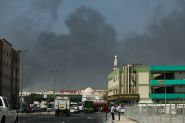- Home
- Middle East
- Iran's Top Diplomat to Visit Russia after US Nuclear Talks

A handout picture released by Iran's Atomic Energy Organization on November 4, 2019, shows shows the atomic enrichment facilities Natanz nuclear research center, some 300 kilometres south of capital Tehran. ©AFP
Iran's foreign minister is to visit ally Russia this week to discuss nuclear negotiations with the United States, ahead of a new round of talks planned between the foes.
On Saturday, Abbas Araghchi held talks with US Middle East envoy Steve Witkoff in Oman -- the highest-level discussions since the 2015 nuclear accord collapsed.
"The first meeting was positive, constructive, compelling," Witkoff said in a Fox News interview on Monday.
Any nuclear deal between the United States and Iran "is going to be much about verification on the enrichment programme", he said, appearing to stop short of calling for a complete dismantling of Tehran's nuclear programme.
US President Donald Trump, who withdrew from the 2015 deal, has brought Iran back into the spotlight since returning to office in January.
In March, he sent a letter to Iran's supreme leader Ayatollah Ali Khamenei, calling for nuclear talks and warning of possible military action if Tehran refused.
Western countries, including the United States, have long suspected Iran of pursuing nuclear weapons, an allegation Tehran has consistently denied, insisting its programme is for peaceful purposes.
Russia, a close ally of Iran and party to the 2015 deal, and China have engaged with Tehran in recent weeks over its nuclear programme.
"Dr Araghchi will travel to Moscow at the end of the week," said foreign ministry spokesman Esmaeil Baqaei, adding that the pre-planned trip would be "an opportunity to discuss the latest developments related to the Muscat talks".
Russian foreign ministry spokeswoman Maria Zakharova said Araghchi would meet his Russian counterpart Sergei Lavrov and other officials.
Iran and the United States have both described Saturday's discussions as "constructive".
Moscow welcomed the Iran-US talks as it pushed for a diplomatic solution and warned that military confrontation would be a "global catastrophe".
Another round of talks between Iran and the United States is to be held in Oman on Saturday, the foreign ministry spokesman told the official IRNA news agency. Rome had earlier been cited as a possible venue.
'Red lines'
Baqaei said the next set of talks would continue to be indirect with Omani mediation, adding that direct talks were "not effective" and "not useful". Oman's foreign minister shuttled between the two delegations at the last talks.
Baqaei had previously said the only focus of the next talks would be "the nuclear issue and the lifting of sanctions", and that Iran "will not have any talks with the American side on any other issue".
Late Sunday, IRNA reported that Tehran's regional influence and its missile capabilities were among its "red lines" in the talks.
Washington reinstated biting sanctions on Tehran following its withdrawal from the 2015 deal three years later.
Iran continued to adhere to the agreement for a year after Trump's withdrawal but later began rolling back its compliance.
Iran has consistently denied it is seeking nuclear weapons.
Trump addressed reporters on Monday regarding Iran, saying "I'll solve that problem" and "That's almost an easy one".
However, it remains unclear whether his remarks referred specifically to nuclear negotiations or broader issues involving the Islamic republic.
Baqaei reiterated that Iran would host United Nations nuclear watchdog chief Rafael Grossi in the coming days but noted that the details of his trip were still "to be decided on".
In a post on X, Grossi confirmed that he would be heading to Tehran "later this week".
"Continued engagement and cooperation with the Agency is essential at a time when diplomatic solutions are urgently needed," he said.
IRNA later reported that Grossi would arrive on Wednesday and meet Araghchi and Mohammad Eslami, the head of Iran's nuclear energy agency.
The head of the International Atomic Energy Agency last visited Iran in November when he held talks with top officials, including President Masoud Pezeshkian.
In its latest quarterly report in February, the IAEA said Iran had an estimated 274.8 kilograms (605 pounds) of uranium enriched to up to 60 percent, which far exceeds the 3.67 percent limit set under the 2015 deal and is much closer to the 90 percent threshold required for weapons-grade material.
By Ahmad Parhizi and Ramin Khanizadeh, AFP
Read more



Comments